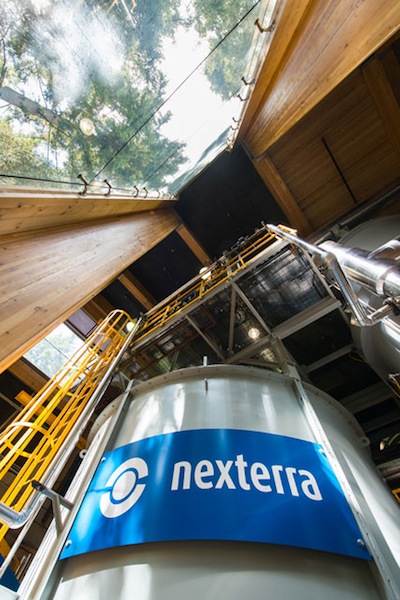
UBC completes CHP system
September 13, 2012
By CNW
September 13, 2012, Vancouver, BC - Nexterra Systems Corp., the University of British Columbia and GE today celebrated the successful completion of an energy-from-renewable-waste combined heat and power (CHP) system located at UBC's Vancouver campus.
This is North America's first commercial demonstration of a transformative system that combines Nexterra's gasification and syngas conditioning technologies with one of GE's high-efficient Jenbacher internal combustion engines.
GE's Jenbacher gas engine will produce 2 MW (megawatts) of clean, renewable electricity that will offset UBC's existing power consumption, enough to power approximately 1,500 homes. The Nexterra system will also generate 3 MW of thermal energy, enough steam to displace up to 12 percent of UBC's natural gas consumption. This will reduce UBC's greenhouse gas emissions by up to 5,000 tonnes per year which is the equivalent of taking more than 1,000 cars off the road.
The successful start-up of the project at UBC – officially named the "Bioenergy Research and Demonstration Facility (BRDF)" – represents an important milestone in Nexterra's quest to reliably convert low-value waste feedstocks into higher value renewable fuels and chemicals. The system has completed a comprehensive testing program for reliability, capacity and emissions, and has successfully connected to the grid.

|
|
| UBC completed an energy-from-renewable-waste combined heat and power system.
|
Using Nexterra's proven gasification technology platform and innovative gas clean-up and thermal cracking solution, the system converts locally-sourced waste wood into a clean, reliable gas that is suitable for use in a high-efficiency, industrial-scale gas engine to produce heat and power. The system will deliver global electrical efficiencies that are 25% higher than traditional methods for producing biomass-based electricity at this scale.
The start-up of the system represents the culmination of more than four years of product development work and collaboration with GE's Gas Engines business. Prior to installing the gas engine at UBC, Nexterra successfully completed more than 5,000 hours of trials at its Product Development Center in Kamloops BC.
"This exciting facility targets a major challenge facing society – the need for new, clean energy solutions that work at a community scale," says UBC President Stephen Toope. "This is a flagship example of UBC as a living laboratory, where researchers, staff, students and partners collaborate on innovations targeting the pressing challenges of our day."
"With the track record at the Product Development Centre and the successful start-up of GE's ecomagination-qualified Jenbacher gas engine at UBC, Nexterra is well on the road to delivering a renewable biomass CHP solution that meets the demanding real-world reliability requirements of district energy providers and distributed power producers worldwide," said Roger George, General Manager, North America, GE Gas Engines. Ecomagination represents GE's commitment to providing innovative solutions that maximize resources, drive efficiencies and help make the world work better.
"This project represents a significant milestone for Nexterra and we are thankful to our partners for helping to make this a tremendous success," said Mike Scott, President and CEO of Nexterra. "We are seeing significant interest in this next-generation solution from around the globe. We look forward to further proving the system out at UBC and then replicating this system worldwide."
"Our government's approach to resource development means investing in the development of innovative renewable energy technologies that create jobs and generate new economic opportunities," said Wai Young, Member of Parliament for Vancouver South, on behalf of the Honourable Joe Oliver, Canada's Minister of Natural Resources. "Today's announcement demonstrates our tangible support for renewable energy projects that increase energy efficiency and drive innovation."
"For innovative technologies to have a real impact, they need to be commercialized and used in the market," said Dr. Vicky Sharpe, President and CEO of Sustainable Development Technology Canada (SDTC). "Nexterra's CHP system is taking a big step in that direction today. We congratulate Nexterra and their partners on the milestone met today."
"Our government is proud to have supported this project from day one because we have made education and research a top priority," says John Yap, Minister of Advanced Education, Innovation and Technology, representing the provincial government which contributed $7 million to the project through several ministries and departments.
"As a catalyst for the BC Bioenergy industry, we've been pleased to support Nexterra's syngas cleaning technology development," said Michael Weedon, Executive Director of the BC Bioenergy Network. "It is excellent to see this innovative technology deployed commercially here at UBC and, with the ongoing research partnership with UBC, Nexterra is well poised to advance the industry here at home and in new export markets."
"With this project, Nexterra, UBC and GE have advanced the industry's clean energy efforts significantly, thereby solidifying the Canadian expertise in green energy," said Jean Hamel, Pulp, Paper and Bioproducts Vice-President, FPInnovations.
Designed by McFarland Marceau Architects, UBC's CHP bioenergy system is housed in a remarkable building that was constructed using cross-laminate timber (CLT), a new solid wood building material that can be used as a low carbon, renewable alternative to steel frame construction. This will be one of the first CLT buildings in North America and will demonstrate its market potential for the forest industry.
Funding support this project was provided by: the Government of Canada (Natural Resources Canada and Western Economic Diversification Canada); the Province of British Columbia (BC Innovative Clean Energy Fund and the Ministry of Forests, Mines and Lands); Sustainable Development Technologies Canada (SDTC), the BC Bioenergy Network and FP Innovations.
Print this page